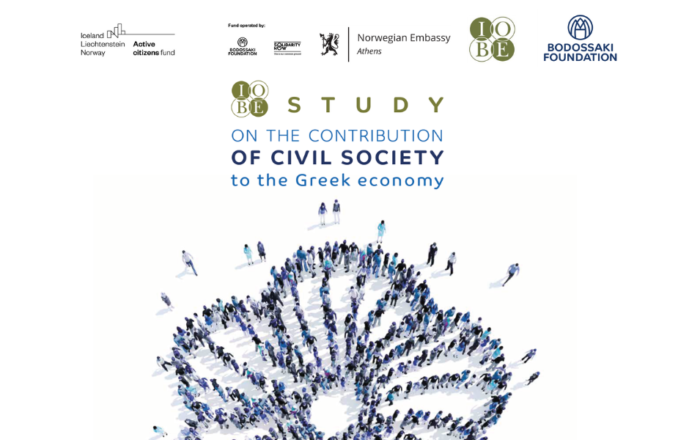The study was conducted as part of the Active Citizens Fund programme
Multi-level contribution and significant scope for growth. This is the shortest possible description of the findings of the study on the contribution of Civil Society to the Greek economy, carried out by the Foundation for Economic & Industrial Research (IOBE) for the Bodossaki Foundation, as part of the Active Citizens Fund programme. This is the first scientific research conducted in Greece to measure and publicise the economic dimension of the contribution of Civil Society organisations at national and local level. It was conducted using large-scale primary research and the application of appropriate economic models and sheds light on the multifaceted contribution of Civil Society in the country, as well as the significant potential for progress in the field.
According to the study’s findings, available here, the activities of Civil Society Organisations (CSOs) support, directly or indirectly, the production of 1.6% of the country’s GDP and the employment of 1.9% of workers in Greece. In absolute terms, the contribution to the GDP of CSOs for 2021 is estimated at €3 billion, supporting 88,400 jobs. These figures do not include the economic value of volunteering, which amounted to €357 million in 2021, corresponding to about 0.2% of the country’s GDP.
In addition, the activities of the organisations have led to a boost in Public revenue due to the stimulation of economic activity in the country, with annual amounts consistently above €1 billion, corresponding to 1.9 – 2.1% of annual State revenue in the three-year period 2019-2021. If the services offered by Civil Society Organisations in Greece had to be provided by the State, their costs for 2021 are estimated at €2.1 to €3.2 billion.
The scale of activity by CSOs depends to a large extent on the acceptance and support they receive from the country’s citizens. About 45.5% of respondents said that they had financially supported an organisation over the previous twelve months (May 2021 – May 2022), with 69.4% having done so on an ad hoc basis and only 22% systematically. Furthermore, Greece scored low in the national rankings of citizens’ contributions to, and trust, in charities. Indeed, at 125th it ranks second to last in the CAF World Giving Index for the decade 2009-2019, and 34th out of 50 countries in the World Value Survey, according to the percentage of citizens who have donated to a Civil Society Organization or a political campaign. Similarly, Greece is 37th of 54 countries in the percentage of respondents who said they trusted charities.
The study shows that there is considerable scope for further development of the activities of CSOs, given the relatively limited geographical scope of the organisations’ activities and the change that would be brought about by improving public trust in the organisations. It is essential that the organisations themselves, which operate in sensitive sectors and manage significant resources, have dependable governance bodies, implement external audit procedures, and operate with maximum transparency. Finally, it is necessary to remove obstacles which hinder the proper functioning of CSOs, mainly by improving the supervisory framework and general cooperation with the state, in order to improve the economic contribution and the significant social impact of their activities in Greece.
The findings of the study were presented during today’s event, which took place at the Athens Conservatory and was introduced by Ms Athina Dessypri, President of the Board of the Bodossaki Foundation, and the Ambassador of Norway, Mrs Lajla Brandt Jakhelln. The results of the study were presented by Mr. Nikos Vettas, Director General of IOBE, Professor of Economics at the Athens University of Economics and Business and Mr. Svetoslav Danchev, Head of the IOBE study team. In addition, good practices of European countries and examples of a dynamic Civil Society were presented by Alexandrina Najmowicz, Secretary General of the European Civic Forum and Aage Borchgrevink, Senior Adviser at the Norwegian Helsinki Committee. The event was attended by representatives of Civil Society organisations and scientific institutions.
For the Bodossaki Foundation, the empowerment of Civil Society is a strategic action pillar. The Foundation aims to develop a strong and independent Civil Society and create the appropriate institutional framework within which it can operate.
The €13.5 million Active Citizens Fund programme, under which the research was carried out, is funded by Iceland, Liechtenstein and Norway and forms part of the European Economic Area (EEA) funding mechanism for the period 2014–2021, known as EEA Grants. The project seeks to strengthen and improve the resilience of Civil Society and publicise its role in promoting democratic processes, enhancing the participation of citizens in public life, and defending human rights. The Active Citizens Fund grant for Greece is managed jointly by the Bodossaki Foundation and SolidarityNow.



